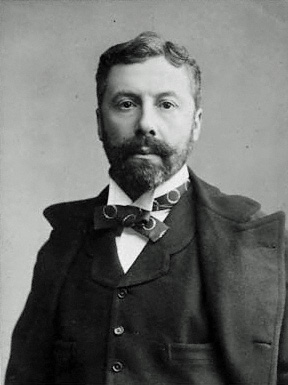
Richard D'Oyly Carte was an English talent agent, theatrical impresario, composer, and hotelier during the latter half of the Victorian era. He built two of London's theatres and a hotel empire, while also establishing an opera company that ran continuously for over a hundred years and a management agency representing some of the most important artists of the day.

The D'Oyly Carte Opera Company is a professional British light opera company which, from the 1870s until 1982, staged Gilbert and Sullivan's Savoy operas nearly year-round in the UK and sometimes toured in Europe, North America and elsewhere. The company was revived for short seasons and tours from 1988 to 2003, and since 2013 it has co-produced four of the operas with Scottish Opera.

Haddon Hall is an English light opera with music by Arthur Sullivan and a libretto by Sydney Grundy. The opera, set at the eponymous hall, dramatises the legend of Dorothy Vernon's elopement with John Manners, resetting the tale in the 17th century.

Rosina Brandram was an English opera singer and actress primarily known for creating many of the contralto roles in the Savoy operas with the D'Oyly Carte Opera Company.

Alice Barnett was an English singer and actress, best known for her performances in contralto roles of the Gilbert and Sullivan operas with the D'Oyly Carte Opera Company.

Edward Solomon was an English composer, conductor, orchestrator and pianist. He died at age 39 by which time he had written dozens of works produced for the stage, including several for the D'Oyly Carte Opera Company, including The Nautch Girl (1891). Early in his career, he was a frequent collaborator of Henry Pottinger Stephens. He had a bigamous marriage with Lillian Russell in the 1880s.

Charles Courtice Pounds, better known by the stage name Courtice Pounds, was an English singer and actor known for his performances in the tenor roles of the Savoy Operas with the D'Oyly Carte Opera Company and his later roles in Shakespeare plays and Edwardian musical comedies.

Fred Billington was an English singer and actor, best known for his performances in baritone roles of the Savoy Operas with the D'Oyly Carte Opera Company. His career with the company began in 1879 and continued with brief interruptions until his death in 1917.

The Nautch Girl, or, The Rajah of Chutneypore is a comic opera in two acts, with music by Edward Solomon, a book by George Dance, and lyrics by Dance and Frank Desprez. It opened on 30 June 1891 at the Savoy Theatre, managed by Richard D'Oyly Carte, and ran until 16 January 1892, for a respectable 200 performances, and then Carte toured the piece in the British provinces and colonies.

W. H. Denny was an English singer and actor in comic operas, operettas and musical theatre. He is best remembered for his portrayal of baritone roles in the Savoy operas.

Quite an Adventure is a one-act comic opera by Edward Solomon with a libretto by Frank Desprez. The farcical plot concerns a house-guest who mistakes his hostess's husband for an intruder.
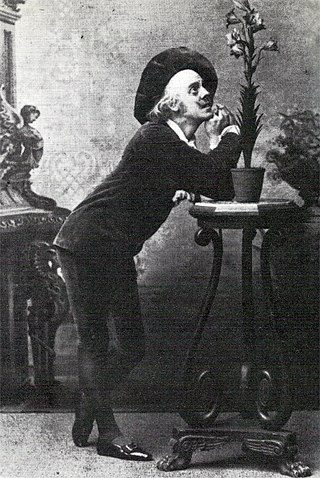
Frank Thornton was an English actor, singer, comedian and producer. Despite a successful stage career in comedies in London, on tour and abroad, Thornton is probably best remembered as the understudy to George Grossmith in a series of Gilbert and Sullivan operas from 1877 to 1884.
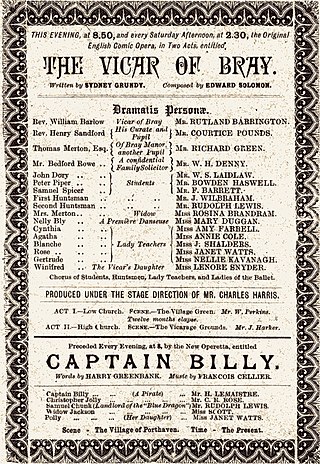
Captain Billy is a one-act comic opera with a libretto by Harry Greenbank and music by François Cellier. It was first performed at the Savoy Theatre on 24 September 1891 until 16 January 1892, as a curtain raiser to The Nautch Girl, and from 1 February 1892 to 18 June 1892, as a curtain raiser to The Vicar of Bray, for a total of 217 performances.

John Le Hay was the stage name of John Mackway Healy, an English singer and actor known for his portrayal of the comic baritone roles in the Savoy Operas. He also appeared in non-musical plays, adaptations of French comic operas and opérettes, and in Edwardian musical comedy, usually in comic roles, though sometimes in more serious character parts. As a skilled ventriloquist he appeared before royalty, and periodically he presented his own one-man entertainment during his half-century long stage career.

William Sydney Penley was an English actor, singer and comedian who had an early success in the small role of the Foreman in Gilbert and Sullivan's Trial by Jury. He later achieved wider fame as producer and star of the prodigiously successful Brandon Thomas farce, Charley's Aunt and as the Rev Robert Spalding in several productions of Charles Hawtrey's farce The Private Secretary.

Charles Kenningham was an English opera singer and actor best remembered for his roles in the 1890s with the D'Oyly Carte Opera Company.
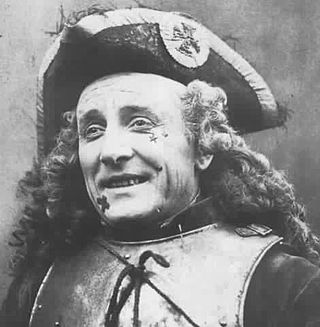
Frank Wyatt was an English actor, singer, theatre manager and playwright.

John Jones Hewson, credited as Jones Hewson, was a Welsh singer and actor known for his creation and portrayal of baritone roles with the D'Oyly Carte Opera Company from 1894 to 1901.

Trial by Jury is a comic opera in one act, with music by Arthur Sullivan and libretto by W. S. Gilbert. It was first produced on 25 March 1875, at London's Royalty Theatre, where it initially ran for 131 performances and was considered a hit, receiving critical praise and outrunning its popular companion piece, Jacques Offenbach's La Périchole. The story concerns a "breach of promise of marriage" lawsuit in which the judge and legal system are the objects of lighthearted satire. Gilbert based the libretto of Trial by Jury on an operetta parody that he had written in 1868.
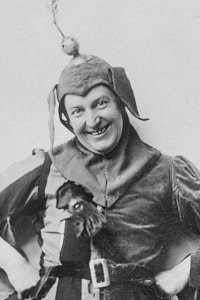
Charles Roby Walenn was an English singer and actor, best known for his performances in the comic baritone roles of the Gilbert and Sullivan operas with touring companies of the D'Oyly Carte Opera Company from 1887 to 1909 and later, off and on through the 1920s, with J. C. Williamson in Australia. Later in his career, he became known for London engagements in the title role of Rev. Spalding in The Private Secretary, which he first played at the Savoy Theatre in 1917, where he had never performed in the Savoy operas.





















